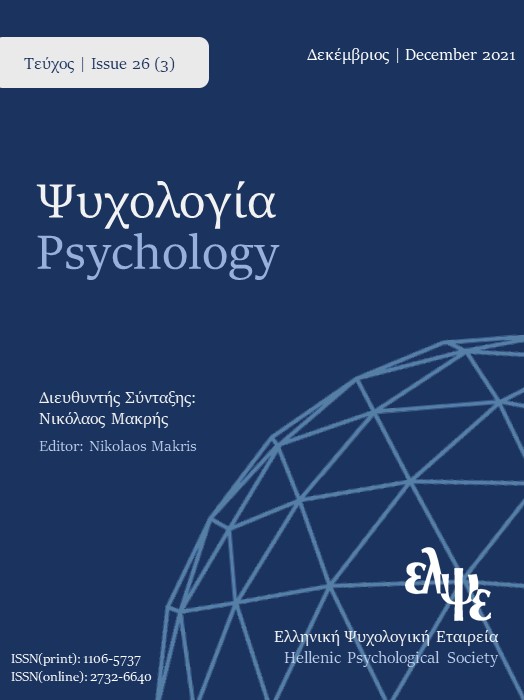Προσωπικότητα, σχέσεις στην οικογένεια και διαστάσεις του σχολικού κλίματος ως προβλεπτικοί παράγοντες της συγχώρεσης στην εφηβεία

Περίληψη
Η συγχώρεση στην εφηβική ηλικία έχει προκαλέσει το αυξανόμενο ενδιαφέρον των ερευνητών διεθνώς, γεγονός που αναδεικνύει την ανάγκη να κατανοηθεί σε μεγαλύτερο βάθος ο ρόλος της στην ευεξία των νέων. Στην παρούσα έρευνα μελετάται η έννοια της συγχώρεσης σε Έλληνες εφήβους και ειδικότερα ο προβλεπτικός ρόλος βασικών διαστάσεων σε ατομικό και συστημικό επίπεδο. Ειδικότερα, ερευνήθηκε κατά πόσο οι παράγοντες της προσωπικότητας με βάση το μοντέλο των 5 Παραγόντων (ατομικό επίπεδο), καθώς και οι σχέσεις στην οικογένεια και το σχολείο (συστημικό επίπεδο) μπορούν να προβλέψουν την τάση των εφήβων να συγχωρούν. Επίσης, μελετήθηκαν κοινωνικοδημογραφικές μεταβλητές όπως το φύλο, η ηλικία, το κοινωνικοοικονομικό και μορφωτικό επίπεδο των γονέων. Στην έρευνα συμμετείχαν 1.378 έφηβοι που φοιτούσαν σε Γυμνάσια και Λύκεια της Αττικής, τα οποία επιλέχθηκαν τυχαία. Τα ευρήματα έδειξαν ότι η νεότερη ηλικία, τα χαμηλότερα επίπεδα νευρωτισμού, τα υψηλότερα επίπεδα εξωστρέφειας και προσήνειας και η υψηλότερη ποιοτική επικοινωνία με τη μητέρα προέβλεπαν υψηλότερη συγχώρεση του εαυτού. Υψηλότερα επίπεδα δεκτικότητας σε εμπειρίες, προσήνειας, ποιοτικής επικοινωνίας με τον πατέρα, θετικής συμπεριφοράς και θετικής στάσης στο σχολείο και χαμηλά επίπεδα έλλειψης σεβασμού προέβλεπαν μεγαλύτερη συγχώρεση των άλλων. Τέλος, χαμηλότερα επίπεδα νευρωτισμού και υψηλότερα επίπεδα εξωστρέφειας, ευσυνειδησίας, θετικής συμπεριφοράς στο σχολείο προέβλεπαν υψηλότερα επίπεδα συγχώρεσης καταστάσεων. Τα ευρήματα υπογραμμίζουν τον σημαντικό ρόλο των παραγόντων της προσωπικότητας και τονίζουν τη σημασία των παρεμβάσεων πρωτογενούς πρόληψης στη σχολική κοινότητα όσον αφορά στο σχολικό κλίμα, οι οποίες θα μπορούσαν να συμβάλουν γενικότερα στην προαγωγή της συγχώρεσης και της ευεξίας των εφήβων.
Λεπτομέρειες άρθρου
- Πώς να δημιουργήσετε Αναφορές
-
Λαμπροπούλου Α., Λιανός Π., & Πούλιος Α. (2023). Προσωπικότητα, σχέσεις στην οικογένεια και διαστάσεις του σχολικού κλίματος ως προβλεπτικοί παράγοντες της συγχώρεσης στην εφηβεία. Ψυχολογία: το περιοδικό της Ελληνικής Ψυχολογικής Εταιρείας, 28(1), 176–194. https://doi.org/10.12681/psy_hps.29819
- Ενότητα
- ΕΜΠΕΙΡΙΚΕΣ ΕΡΓΑΣΙΕΣ

Αυτή η εργασία είναι αδειοδοτημένη υπό το Creative Commons Attribution-ShareAlike 4.0 International License.
Το περιοδικό ΨΥΧΟΛΟΓΙΑ έχει υιοθετήσει μία πολιτική Platinum open-access. Τα έξοδα υποβολής, επεξεργασίας ή δημοσίευσης των εργασιών καλύπτονται από την Ελληνική Ψυχολογική Εταιρεία. Τα πνευματικά δικαιώματα των δημοσιευμένων εργασιών προστατεύονται από την άδεια 'Creative Commons Attribution-ShareAlike 4.0 International'. Οι Συγγραφείς διατηρούν τα Πνευματικά Δικαιώματα και χορηγούν στο περιοδικό το δικαίωμα της πρώτης δημοσίευσης. Η άδεια αυτή επιτρέπει σε τρίτους, να χρησιμοποιούν την εργασία σε οποιαδήποτε μορφή, με την προϋπόθεση της διατήρησης των διατυπώσεων που προβλέπονται στην άδεια σχετικά με την αναφορά στον αρχικό δημιουργό και την αρχική δημοσίευση στο περιοδικό ΨΥΧΟΛΟΓΙΑ. Επιπλέον, κάθε διανομή της εργασίας οφείλει να γίνεται με τους ίδιους όρους διανομής, δηλαδή με την ίδια άδεια Creative Commons.





